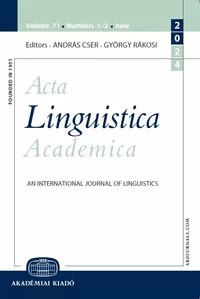The vowels that almost harmonized: On Old Hungarian long vowels
The vowels that almost harmonized: On Old Hungarian long vowels
Author(s): András Cser, Beatrix Oszkó, Zsuzsa VárnaiSubject(s): Phonetics / Phonology, Historical Linguistics
Published by: Akadémiai Kiadó
Keywords: Old Hungarian; vowel harmony; grammaticalization; labial harmony
Summary/Abstract: While in Modern Hungarian labial harmony is confined to short front non-high vowels, in Late Old Hungarian some suffixes including non-high long vowels were also able to undergo labial harmony. This paper discusses three of the most widely attested suffixes in question, the ablative, the delative and the elative nominal case suffixes. All the three suffixes were originally grammaticalized from case-marked nouns; their participation in both backness and labial harmony followed on their integration into the morphological structure of host nouns. Their ability to undergo labial harmony was subsequently lost. An explanation is proposed for why they stopped harmonizing in labiality, based partly on the phonological parameters of variation extant in Late Old Hungarian, partly on homophony avoidance in the changing paradigmatic space of the case system.
- Issue Year: 72/2025
- Issue No: 1
- Page Range: 70-81
- Page Count: 12
- Language: English

